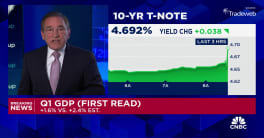Markets failed to move on the release of the Fed's Beige Book, an anecdotal summary of the 12 District Banks over the six weeks ending Aug. 25. Economists say the report continues to reveal broad-based weakness, tight credit conditions and elevated price pressures, though not a single region was in outright contraction.
The Federal Open Market Committee and analysts look to the compilation of comments by regional Fed banks to get a non-numerical picture of economic conditions across the country.
Ian Lyngen, fixed income strategist at RBC Greenwich Capital, said the market is "doing nothing with the release, favoring a sideways grind in an otherwise uneventful afternoon market."
He said the Beige Book's theme "is one of ongoing weakness, with some signs of lingering pricing pressure -- as the pullback in commodities has yet to flow down the chain." Other details were not giving much insight, he added.
However, Millan Mulraine, economics strategist at TD Securities, said the report's findings are "particularly interesting" as they capture the tail-end of the rebate cheques. Yet he also said the Book is "of uncertain value" because the previous releases have suggested dire times, which contrasts the "astonishingly strong" GDP report from the second quarter.
The St. Louis and Cleveland districts reported further weakening in the past six weeks, while the Boston and New York districts saw signs of stabilization, and Kansas City noted a slight improvement.
Mulraine said the primary difference between this report and the previous one is that no region is recording an outright decline in economic activity. He said it was no surprise that consumer spending was slow in most districts, as consumers concentrated on necessary items while shying away from clothing and appliances.
Exports, a major contributor to second-quarter GDP, were "bolstering manufacturing activity," the report said, but several districts noted some recent slowing.
The labour market was said to be "unchanged or somewhat softer in most Districts," while wage pressures were considered "moderate."
Manufacturing activity declined in most districts, though Minneapolis and Kansas City reported a slight improvement.
In real estate, residential markets "remained soft" in most districts, while commercial activity was mostly slow - including a further slackening in demand for office and retail space.
The last Beige Book, released on July 23, reported that economic conditions across the U.S. "slowed somewhat," with five of the 12 districts reporting continued softness. Price pressures were elevated across the country and credit conditions were tight in the anecdotal report.
The report, based on information collected on Aug. 25, was prepared by the Philadelphia Fed.
By Patrick McGee and edited by Sarah Sussman







